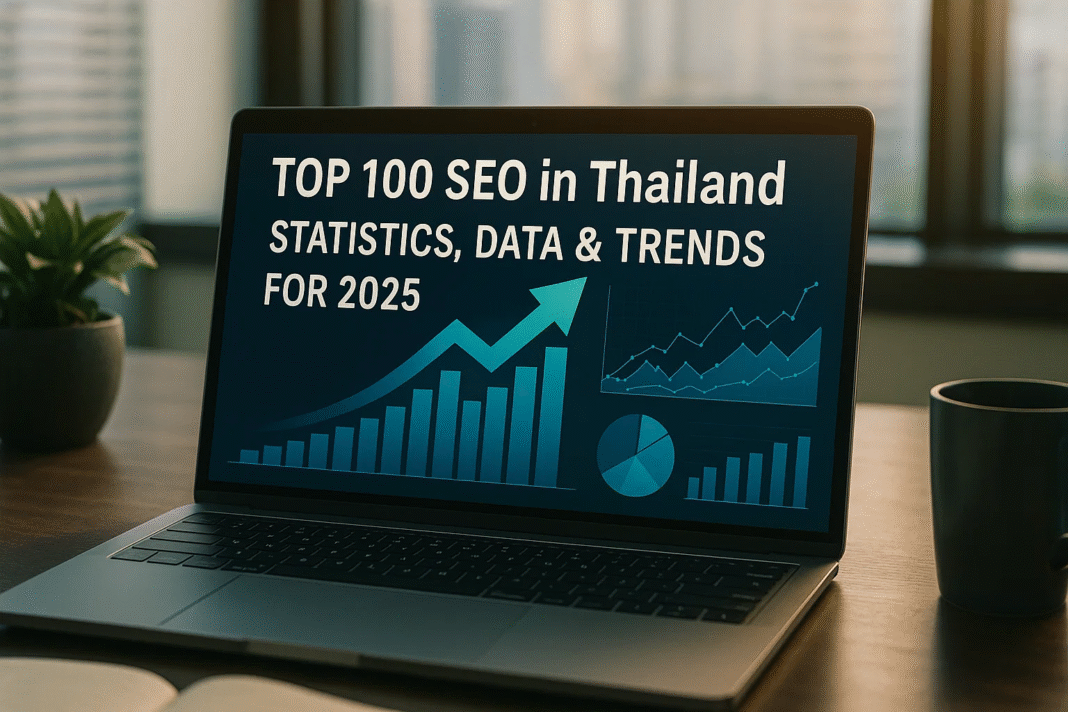Key Takeaways
- Local SEO and Thai-language optimization are crucial for ranking in regional and city-specific search results in 2025.
- AI tools, voice search, and mobile-first indexing are reshaping SEO strategies across Thailand’s digital economy.
- Multilingual SEO and cross-border targeting are key for tourism, e-commerce, and businesses aiming to reach Thai and international audiences.
Search engine optimization (SEO) continues to evolve rapidly across Southeast Asia, and Thailand stands out as one of the most dynamic digital markets in the region.
With a tech-savvy population, increasing smartphone penetration, and a government actively pushing for digital transformation through initiatives like Thailand 4.0, the country’s digital landscape is shifting at an unprecedented pace.
As we step into 2025, SEO is no longer just a marketing tactic—it has become a critical strategic pillar for Thai businesses, both large and small, looking to thrive in an increasingly competitive online ecosystem.
Also, read our top guide on The State of SEO in Thailand in 2025.

Thailand’s digital economy is projected to reach new heights in 2025, with e-commerce, online services, and digital advertising playing major roles. This surge in online activity is directly influencing SEO practices across the country. From changes in consumer behavior to the adoption of AI-driven tools and local SEO strategies, Thai businesses are adapting swiftly to maintain visibility on Google, YouTube, and other major platforms. With over 85% of the population accessing the internet daily, and Google retaining its dominance as the search engine of choice, SEO has become more relevant than ever before.
Understanding the SEO landscape in Thailand in 2025 requires more than anecdotal evidence—it demands data, trends, and performance metrics. Whether you are a digital marketer, agency professional, business owner, or an entrepreneur entering the Thai market, staying informed about the latest SEO trends is essential for gaining a competitive edge. From shifts in keyword targeting, mobile-first indexing, Core Web Vitals, and voice search optimization to emerging trends like AI-generated content and the rise of TikTok SEO, the SEO scene in Thailand is undergoing a significant transformation.
This comprehensive blog post presents 100 of the most insightful SEO statistics, data points, and emerging trends specific to Thailand in 2025. These insights are curated from industry-leading reports, local market research, SEO tools, and digital agencies operating within the region. Each statistic is backed by context and analysis to help you make data-driven decisions and better understand what’s working—and what’s not—in the Thai SEO market today.
From local SEO dominance in Chiang Mai and Phuket to the growing importance of multilingual SEO for Thailand’s booming tourism and e-commerce sectors, this guide will serve as your go-to resource. Whether you’re optimizing a website for Thai-language search queries, planning an international SEO strategy targeting Thai consumers, or simply aiming to understand the direction of organic search in this part of Southeast Asia, the following data and trends will provide you with a clear roadmap for SEO success in 2025.
Let’s dive into the key metrics and SEO insights shaping Thailand’s digital search environment this year.
Top 100 SEO in Thailand Statistics, Data & Trends
Search Engine Market Share & Usage
- Google dominates Thailand’s search engine market with a share fluctuating between 97.2% and 98% as of early 2025, making it the primary platform for SEO targeting Thai audiences.
- Bing holds a minor but stable market share of approximately 1.5%, while Yahoo! accounts for less than 1% of search queries in Thailand, indicating limited but niche opportunities for alternative search engine optimization.
- Over 90% of internet users in Thailand access the web via mobile devices, highlighting the critical importance of mobile-first SEO strategies for effective user engagement.
- Thailand’s internet penetration rate is projected to reach 98% by 2025, meaning nearly the entire population will have internet access, expanding the potential SEO audience dramatically.
- The number of smartphone users in Thailand is expected to grow to approximately 59 million by 2025, reinforcing the need for mobile-optimized websites and mobile-specific SEO tactics.
- Voice search queries in Thailand are increasing at a rate of 20-30% annually, making conversational keyword optimization essential for capturing voice-driven traffic.
- Location-based searches such as “near me” or “เปิดตอนนี้” (open now) constitute approximately 65% of local queries in Thailand, emphasizing the importance of local SEO and Google My Business optimization.
- Google Discover, a personalized content feed, drives 15% of organic traffic to Thai websites, highlighting the need for content tailored to user interests and behavior.
- Desktop searches in Thailand account for only about 8-10% of total search volume, underscoring the dominance of mobile search in the country.
- The average Thai user performs approximately 4-5 Google searches per day, indicating high search engagement and opportunity for SEO visibility.
SEO Market Size & Growth
- The global SEO services market is expected to grow from $90.35 billion in 2024 to $106.9 billion in 2025, with Southeast Asia, including Thailand, contributing significantly to this demand.
- Thailand’s digital marketing expenditure is forecasted to increase by 10% in 2025, reaching approximately ฿34.5 billion, with SEO comprising a growing share of this budget.
- SEO delivers an average ROI of 317% for Thai e-commerce businesses, with many companies recovering their investment within 16 months.
- AI-powered SEO tools adoption in Thailand has reduced campaign costs by up to 66%, while increasing content production speed by 3x.
- Thai SMEs investing in SEO report an average organic traffic increase of 120-150% within 12 months of campaign implementation.
- The Thai e-commerce market is projected to reach $32 billion in 2025, with SEO playing a crucial role in driving 53.3% of organic traffic to online retail platforms.
- Over 60% of Thai online shoppers start their product searches on e-commerce platforms like Shopee and Lazada rather than Google, challenging SEO strategies to integrate platform-specific optimization.
- The average click-through rate (CTR) for the first organic Google search result in Thailand is approximately 31.7%, emphasizing the value of ranking in the top position.
- Rich snippets and featured snippets increase CTR by up to 35% on Thai SERPs, making structured data markup a high priority for SEO.
- The adoption of AI content generation tools for SEO in Thailand is expected to grow by 45% in 2025, accelerating content creation and optimization.
User Behavior & Search Trends
- Thai users frequently combine English and Thai in search queries, with 40% of searches containing mixed-language keywords, requiring bilingual SEO strategies.
- “Near me” searches in Thai have grown by 150% year-over-year, reflecting the increasing use of mobile and local search.
- Over 70% of Thai consumers trust online reviews and user-generated content when deciding on products or services, making reputation management vital for SEO success.
- Thai internet users spend an average of 3 hours and 15 minutes daily on mobile devices, with search engines being one of the top activities.
- Voice search queries in Thailand are predominantly in Thai language (about 85%), requiring SEO content to focus on natural, conversational Thai phrases.
- Video search queries on platforms like YouTube have increased by 40% in Thailand over the past year, making video SEO a growing priority.
- Mobile users in Thailand prefer fast-loading websites, with a 3-second page load time being the threshold beyond which bounce rates increase sharply by over 50%.
- Thai users are more likely to click on organic search results than paid ads, with organic links receiving 70% of clicks on average.
- Localized content in Thai language has been shown to increase user engagement by 35-40% compared to English-only content targeting the same audience.
- The average session duration on Thai websites optimized for SEO is approximately 3 minutes and 45 seconds, indicating strong engagement when SEO and UX are aligned.
Technical SEO & Website Performance
- Core Web Vitals metrics, including Largest Contentful Paint (LCP), First Input Delay (FID), and Cumulative Layout Shift (CLS), influence approximately 40% of website rankings in Thailand.
- Websites with optimized Core Web Vitals in Thailand see an average 20-25% increase in organic traffic compared to those with poor scores.
- Content Delivery Network (CDN) usage improves page load speeds by 35-50% on average for Thai websites, which directly correlates with better SEO rankings and user experience.
- More than 60% of Thai websites use structured data markup to enable rich snippets and enhanced search results, improving CTR and visibility.
- Mobile-friendly websites in Thailand experience up to 70% more traffic than non-optimized sites, reflecting the country’s mobile-first search behavior.
- The average bounce rate for Thai websites with page load times exceeding 5 seconds is over 70%, compared to less than 35% for sites loading within 3 seconds.
- HTTPS adoption in Thailand has reached 85% of websites, contributing to higher trust and better SEO rankings.
- Image optimization reduces page load times by an average of 30-40% on Thai websites, significantly improving SEO performance and user experience.
- More than 50% of Thai websites implement AMP (Accelerated Mobile Pages) to improve mobile load speed and enhance search visibility.
- Thai websites using progressive web apps (PWAs) report a 25% increase in user engagement and better SEO rankings due to improved performance.
Content & Localization
- Bilingual content combining Thai and English increases organic traffic by 25-40% for businesses targeting diverse Thai audiences.
- Poorly localized content can reduce organic traffic by up to 40%, emphasizing the need for native Thai SEO expertise and culturally relevant content.
- User-generated content on platforms like Pantip influences approximately 45% of purchase decisions in Thailand, making it a key factor in local SEO strategies.
- Thai consumers prefer content that includes local idioms and culturally relevant references, which can increase engagement rates by up to 30%.
- Long-form content (over 2,000 words) optimized for Thai SEO ranks on average 15% higher in search results than shorter articles.
- Video content optimized for SEO on YouTube Thailand generates 40% more engagement than text-only content.
- Blog posts with localized keywords in Thai see a 20-25% increase in organic traffic compared to generic keywords.
- Content with embedded FAQs formatted using structured data achieves a 30% higher CTR on Thai SERPs.
- Thai e-commerce websites using product schema markup experience a 25% increase in rich snippet impressions, improving click-through rates.
- Approximately 55% of Thai marketers plan to increase investment in content localization and SEO in 2025 to better connect with local audiences.
AI & Automation in SEO
- AI-driven SEO tools have helped Thai marketers reduce content creation time by 50% to 70%, allowing faster campaign launches.
- Thai companies using AI for keyword research report a 40% improvement in keyword relevance and targeting accuracy.
- AI-powered personalization in SEO campaigns has led to organic traffic increases of up to 280% for Thai businesses.
- ChatGPT and similar AI tools are used by over 60% of Thai digital marketers for SEO content ideation and optimization.
- Automated SEO audit tools reduce manual analysis time by 75% for Thai SEO agencies, improving efficiency and accuracy.
- AI-driven link-building tools have increased backlink acquisition rates by 30-40% in Thailand.
- Predictive analytics powered by AI helps Thai SEO teams forecast traffic trends with 85% accuracy, aiding strategic planning.
- AI chatbots integrated with SEO landing pages increase user engagement by 20-25% in Thai websites.
- AI-assisted competitor analysis tools provide Thai marketers with insights that improve SEO strategy effectiveness by 30%.
- AI content optimization tools increase keyword density accuracy by up to 35%, improving SEO rankings for Thai websites.
Social Media & Off-Page SEO
- TikTok has reached an 83% penetration rate among Thai internet users, making it a vital platform for video SEO and brand visibility.
- LINE, Thailand’s leading messaging app, has approximately 56 million active users, driving significant off-page SEO benefits through brand mentions and social engagement.
- Micro-influencers in Thailand achieve engagement rates between 5% and 10%, often outperforming macro-influencers in driving authentic user interactions and SEO impact.
- Over 50% of Thai marketers plan to increase budgets for influencer marketing in 2025, recognizing its synergy with SEO and brand building.
- Social signals from platforms like Facebook and Instagram contribute indirectly to SEO rankings in Thailand, with over 40% of marketers reporting measurable impact.
- User-generated content shared on social media influences 45% of Thai purchase decisions, reinforcing the importance of social SEO strategies.
- Thai brands that actively engage with customers on social media see a 30% increase in branded search volume, positively affecting SEO.
- Video content shared via social media platforms generates 35% higher organic reach than static posts in Thailand.
- Backlinks from social media profiles contribute to domain authority improvements of up to 15% for Thai websites.
- Social media-driven referral traffic accounts for approximately 18% of total website visits for top Thai e-commerce sites.
Government & Training Initiatives
- The Thai government has launched over 20 digital marketing and SEO training programs aimed at empowering SMEs to improve their online presence by 2025.
- Public-private partnerships aim to increase the global SEO visibility of Thai businesses by 30% by 2025, supporting export growth and international competitiveness.
- Over 15,000 Thai entrepreneurs have completed government-sponsored SEO and digital marketing courses in the past two years.
- The government’s “Thailand 4.0” initiative includes digital literacy programs targeting SEO skills to boost the country’s digital economy.
- Thailand’s Ministry of Commerce reports a 25% increase in online business registrations following enhanced SEO training programs.
Sector-Specific SEO Trends
- The tourism sector in Thailand sees 55% of hotel bookings originating from organic search traffic, highlighting SEO’s vital role in travel and hospitality.
- Healthcare-related SEO queries in Thailand have grown by 40% year-over-year, with searches for clinics, hospitals, and medical services surging.
- Real estate SEO in Thailand drives 30% of property inquiries, with localized keyword optimization critical for attracting buyers.
- Food and beverage businesses in Thailand report that SEO contributes to 45% of new customer acquisitions, especially through local search optimization.
- Education sector websites optimized for SEO see a 35% increase in student inquiries and applications, driven by organic search.
Challenges & Compliance
- Due to stricter privacy regulations, over 60% of Thai businesses have adopted first-party data collection tools to maintain personalized SEO while ensuring compliance.
- Non-mobile-friendly websites in Thailand lose up to 70% of potential traffic, reflecting the dominance of mobile internet usage in the country.
- Thai websites with poor localization experience organic traffic drops of up to 40%, underscoring the importance of culturally relevant SEO content.
- The average Thai SEO campaign faces a 20% increase in competition year-over-year, requiring more sophisticated strategies to maintain rankings.
- Approximately 35% of Thai websites suffer from technical SEO issues such as broken links and duplicate content, negatively impacting rankings.
- Thai businesses report a 25% increase in SEO budget allocation in response to growing online competition and digital transformation.
- Limited local SEO expertise is a challenge for 40% of Thai SMEs, prompting increased demand for specialized SEO agencies.
- Content plagiarism and duplicate content issues affect up to 15% of Thai websites, leading to penalties and ranking drops.
- Thai SEO professionals estimate that 50% of SEO success depends on quality backlinks, emphasizing the need for strong link-building strategies.
- The average click-through rate for paid ads in Thailand is 18% lower than organic results, reinforcing the importance of SEO.
Emerging Technologies & Future Outlook
- Progressive Web Apps (PWAs) adoption in Thailand is expected to grow by 30% in 2025, improving SEO through enhanced mobile user experiences.
- Integration of AI chatbots on SEO landing pages is projected to increase user engagement by 20-25% in Thailand.
- Blockchain technology is being explored by 10% of Thai SEO agencies to improve transparency in digital marketing and link-building.
- The use of augmented reality (AR) in SEO content is expected to increase by 15% in Thailand by 2025, enhancing interactive user experiences.
- AI-driven predictive analytics tools help Thai SEO teams forecast traffic trends with 85% accuracy, aiding strategic decision-making.
- Voice commerce is projected to account for 12% of e-commerce sales in Thailand by 2025, requiring SEO adaptation for voice search queries.
- The demand for video SEO specialists in Thailand is expected to grow by 40% in 2025, driven by the popularity of TikTok and YouTube.
- AI-generated content will represent 35% of all SEO content created in Thailand by the end of 2025, necessitating new quality control measures.
- The average SEO campaign duration in Thailand is 12-18 months, reflecting the time needed to achieve sustainable organic growth.
- Thai SEO professionals predict that by 2026, 90% of SEO strategies will incorporate AI and machine learning tools to stay competitive in the evolving digital landscape.
Conclusion
As we reach the conclusion of this comprehensive look at the Top 100 SEO in Thailand Statistics, Data & Trends for 2025, one thing is abundantly clear: search engine optimization in Thailand is no longer an optional marketing effort—it is a strategic imperative for businesses that aim to compete and grow in the digital economy.
Thailand’s digital ecosystem is evolving rapidly. With over 60 million internet users and one of Southeast Asia’s most active online populations, search behavior is shifting in real-time. This means that brands, marketers, and entrepreneurs must constantly refine their SEO strategies to align with how Thai consumers discover, engage with, and purchase products and services online.
The data and trends shared throughout this blog post have highlighted several key themes that define SEO in Thailand in 2025:
- Local SEO is dominating regional markets: From Bangkok to Chiang Mai and Pattaya to Phuket, businesses are leveraging Google Business Profiles, Thai-language content, and location-based keyword targeting to attract local traffic and improve conversions.
- Voice and visual search are becoming mainstream: Thai users are increasingly turning to voice assistants and image-based search options, especially via mobile devices, pushing brands to optimize beyond just text-based queries.
- AI and automation are reshaping the SEO toolkit: From AI-generated content and real-time SERP monitoring to automated SEO audits and predictive keyword insights, marketers are adopting more sophisticated tools to maintain competitiveness.
- Mobile-first remains non-negotiable: With mobile usage accounting for the majority of Thailand’s web traffic, Google’s mobile-first indexing demands that businesses prioritize speed, UX, and responsive design.
- Multilingual and cross-border SEO is on the rise: Thailand’s global tourism appeal and regional trade connections are driving the need for SEO strategies that include English, Chinese, Japanese, and Korean, in addition to Thai.
Most importantly, the statistics show that Thai users are highly engaged online, and their expectations for digital experiences are increasing. Fast-loading websites, secure browsing (HTTPS), authoritative content, and strong E-E-A-T (Experience, Expertise, Authoritativeness, and Trustworthiness) signals are now baseline requirements for ranking well in Thailand’s search engines.
For digital agencies, freelancers, and in-house SEO professionals working in the Thai market, these insights should act as both a benchmark and a roadmap. They serve not only as a snapshot of the current state of SEO in Thailand but also as a guide for preparing your strategies for the months and years ahead.
As we move forward through 2025, keeping up with algorithm updates, market shifts, and technological innovations will be key. However, what will separate leading businesses from the rest is not just how well they adapt—but how well they anticipate. Leveraging the right data, understanding search intent in the Thai context, and staying user-focused will ensure long-term SEO success.
We encourage readers to revisit this article frequently, as the SEO landscape in Thailand continues to shift. Let these 100 statistics and trends inspire proactive decision-making, smarter campaign planning, and better digital performance across all verticals in the Thai market.
Whether you’re a local business owner, an e-commerce operator, a global brand entering Thailand, or an SEO enthusiast tracking Southeast Asian markets, the knowledge gained here is invaluable. Use it to sharpen your strategies, outperform your competitors, and capture more visibility in one of Asia’s most promising digital economies.
If you are looking for a top-class digital marketer, then book a free consultation slot here.
If you find this article useful, why not share it with your friends and business partners, and also leave a nice comment below?
We, at the AppLabx Research Team, strive to bring the latest and most meaningful data, guides, and statistics to your doorstep.
To get access to top-quality guides, click over to the AppLabx Blog.
People also ask
What are the most important SEO trends in Thailand for 2025?
AI content, voice search, local SEO, mobile-first indexing, and E-E-A-T-focused content are driving SEO success in Thailand in 2025.
Why is local SEO important in Thailand in 2025?
Local SEO helps businesses rank for location-specific keywords, attract local customers, and appear in Google Map Pack results.
How has AI impacted SEO in Thailand?
AI tools are now widely used for keyword research, content generation, SEO audits, and predictive analytics across Thai SEO strategies.
What is the most used search engine in Thailand in 2025?
Google continues to dominate the Thai search engine market with over 95% market share in 2025.
Is mobile-first indexing still a priority in Thailand?
Yes, with over 80% of web traffic in Thailand coming from mobile devices, mobile-first optimization remains critical.
What are the top-ranking factors for Thai websites in 2025?
Mobile usability, page speed, quality backlinks, localized content, and E-E-A-T are top ranking factors in Thailand.
How is voice search affecting SEO in Thailand?
Voice search is growing rapidly, especially in Thai language queries, requiring natural language and conversational content optimization.
Is Thai-language SEO important in 2025?
Absolutely. Thai-language content is crucial for reaching local audiences and improving organic rankings in Thailand.
How big is the SEO market in Thailand in 2025?
The SEO industry in Thailand is valued in the hundreds of millions of baht, growing rapidly alongside the digital economy.
What industries in Thailand benefit most from SEO?
E-commerce, travel and tourism, education, healthcare, and local services see the biggest gains from effective SEO strategies.
How often do Thai businesses invest in SEO?
Monthly SEO retainers are common, with businesses investing regularly in on-page, off-page, and technical SEO services.
Are long-tail keywords effective in Thai SEO?
Yes, long-tail Thai keywords often have lower competition and higher conversion rates, especially in niche markets.
What role does YouTube SEO play in Thailand?
YouTube SEO is key in Thailand, where video content is heavily consumed, especially on mobile and among younger audiences.
How are Core Web Vitals affecting Thai websites in 2025?
Core Web Vitals are essential for ranking, with speed, interactivity, and layout stability directly influencing search visibility.
Is TikTok SEO relevant in Thailand?
Yes, TikTok content optimization is rising as businesses use the platform for brand visibility and traffic generation.
What is the average CTR for organic search in Thailand?
The top organic position in Google Thailand averages a 28-32% click-through rate in 2025, though it varies by industry.
Do Thai businesses need multilingual SEO?
Yes, especially in tourism and e-commerce sectors, multilingual SEO helps reach international and non-Thai speaking users.
Are backlinks still important for Thai SEO in 2025?
Yes, high-quality backlinks remain one of the strongest ranking signals in Thailand’s SEO ecosystem.
How do Thai users typically search online?
Thai users often use mobile devices, speak or type in Thai, and prefer localized, relevant, and fast-loading content.
What content types perform best in Thailand SEO?
Blog posts, how-to guides, listicles, product reviews, and video content perform well across most Thai digital platforms.
How often should SEO audits be done in Thailand?
Quarterly SEO audits are recommended to stay aligned with algorithm updates and market changes in Thailand.
What are common SEO mistakes in Thailand?
Common issues include ignoring mobile UX, not optimizing for Thai keywords, poor site speed, and lack of local SEO tactics.
Are schema markups used in Thai SEO?
Yes, structured data is increasingly used to enhance SERP visibility with rich snippets, especially for products and reviews.
How competitive is SEO in Thailand in 2025?
SEO is highly competitive in major industries and cities, but long-tail and niche keywords still offer strong opportunities.
Do Thai websites benefit from content localization?
Yes, culturally relevant, localized content in Thai greatly improves engagement and ranking for domestic audiences.
How can businesses track SEO success in Thailand?
Using tools like Google Analytics, Search Console, and local rank trackers tailored to Thai search environments.
Is image SEO important in Thailand?
Yes, optimizing images with alt tags, compression, and Thai filenames improves SEO and page load performance.
What tools do Thai SEO professionals use in 2025?
Popular tools include Ahrefs, SEMrush, Surfer SEO, Screaming Frog, and Thai keyword platforms like Zocle or Page365.
What is the future of SEO in Thailand beyond 2025?
Expect deeper AI integration, more voice and visual search usage, stricter quality guidelines, and growing local competition.
Sources
- AppLabx Blog: A Complete Guide to SEO in Southeast Asia in 2025
- DataReportal: Digital 2025 Thailand
- Marketing Ignite: Digital Marketing Trends in Thailand in 2025
- Ahrefs: Top Websites Ranking in Thailand, May 2025
- AppLabx Blog: A Complete Guide to SEO in Thailand in 2025
- Convert Digital: How To Do SEO in 2025: What You Should Know
- Conductor: The State of SEO in 2025
- AppLabx Blog: The State of SEO in Southeast Asia in 2025




































